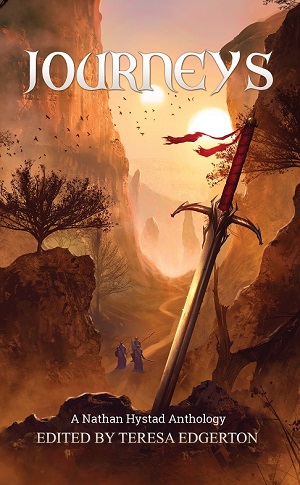“Journeys”, “The Road to Hadrumal”, and a story’s journey
Originally published at Juliet E. McKenna. You can comment here or there.

Today sees the publication of an anthology which I’m very pleased to be part of: Journeys (from Woodbridge Press) offers fourteen epic fantasy stories of daring, death and glory from an array of talented and interesting authors. To be precise, there are tales from John Gwynne, Adrian Tchaikovsky, Gail Z. Martin, me, Julia Knight, Juliana Spink Mills, Jacob Cooper, Samanda R Primeau, Steven Poore, Davis Ashura, Dan Jones, Charlie Pulsipher, Anna Dickinson, and Thaddeus White.
My own story? Well, I may not be writing novels set in Einarinn at the moment but that world is still very much in my thoughts, both in terms of what’s going on with all the characters we know and also, I find I reflect now and then, on key moments in that world’s history. The Road to Hadrumal picks up on some hints dropped throughout those books, from The Thief’s Gamble all the way to The Hadrumal Crisis trilogy, about the origins of wizardry’s organisation. I thought I’d look a little more closely at Trydek, the very first Archmage. Who was he, before he became the revered father of magic? Before he made his way to Hadrumal? What prompted him to make that particular journey? What sent elemental magic down the path that’s lead to its power and influence in Einarinn’s present day?
Well, you can read the story to find out. What I want to talk about here is how writing this particular story enabled me to show a group of aspiring SF&Fantasy writers the journey that a piece of fiction takes, whether you’re just starting out, or whether you’re someone like me with fifteen novels and umpteen short stories to your credit. More than that, I’m convinced that every story must take this journey if it’s going to be worth reading.
Last December I was teaching on a residential course at Moniack Mhor, the Scottish Creative Writing Centre, up near Inverness. As part of my preparation, I had submissions from the students to critique. This means I arrived a folder of pages extensively marked up with red pen… Now, getting your work back covered in queries, suggestions and corrections is not necessarily an easy thing to handle. Writing’s such an intensely personal thing and we invest so much time and effort in it, that seeing it criticized can really sting. I know that full well myself. So what could I offer these keen writers, to ease that impact?
I realised I could show them the editorial notes that I had been sent for this particular story. As it happened, that was a page’s worth. Now, Teresa Edgerton knows what she’s doing. She started off by telling me what she particularly liked in the story, highlighting original angles that had caught her eye and complimenting me on my clean prose. That was about three or four lines worth.
And then… she highlighted the things which I needed to address in that final draft story. Points where the pace needed looking at. Points where character motivations and their reactions needed further consideration. Points where what I had written might challenge reader engagement. She offered a few thoughts on possible routes to pursue, though of course, as all good editors agree, deciding what to do was up to me. It’s my story after all.
Those notes filled the rest of the page. Did this mean this was a bad story? Did this mean I was kidding myself calling myself a writer? Did it mean that I’d learned nothing over those fifteen novels and however many stories? Not at all. I’m an experienced author and I’ve learned to demand a high standard of myself. (Go and read some of these free stories if you want to check.)
But every story needs fresh eyes. In this particular instance, Teresa’s viewpoint was invaluable and all the more so because she’s not an established reader of my Einarinn books. Her comments made me realise that I had been subconsciously writing for people with a far greater knowledge of my existing work than was either fair or desirable in a story like this. Among other things, I was presuming background knowledge that would generate tension that wasn’t there on the page. I was including additional details to tweak tantalizing loose threads from the novels which played no direct part in these events.
Was I thrilled to learn this? No, of course I wasn’t, not initially. I told you that feedback can sting, even now, even just a little bit. Surely my story was perfect? I must have grumbled into my coffee for oh, at least two minutes…
Then I told myself that was more than enough self-indulgence and got to work. Because on my personal journey as a writer over nearly twenty years now, I’ve learned that this is how writing good fiction works. So I sat and thought and then I tightened things up here and there. I cut and trimmed elsewhere, and clarified this and that. It wasn’t a great deal of work but now that I had seen this story through Teresa’s eyes, I had a whole new, sharper focus.
So that’s the story of this particular tale’s journey. Enjoy!
Oh, and those aspiring writers at Moniack Mhor? They worked with me so positively on my feedback that I have great hopes of their future success.
“Journeys” on Amazon UK
“Journeys” on Amazon US